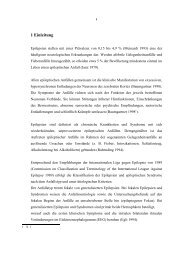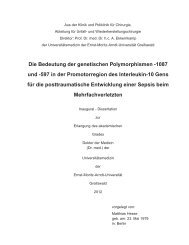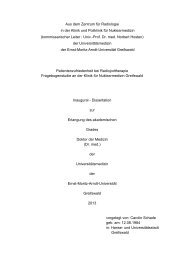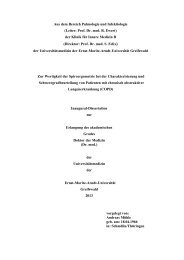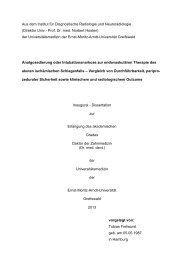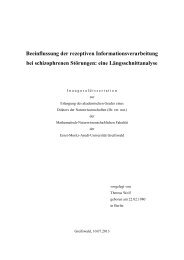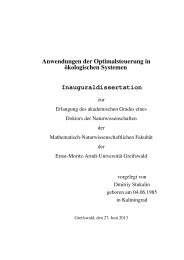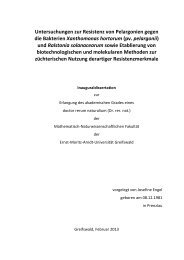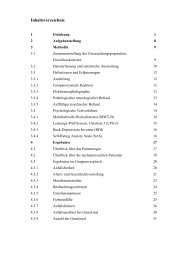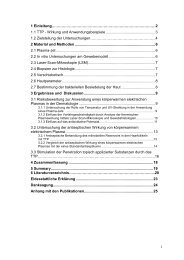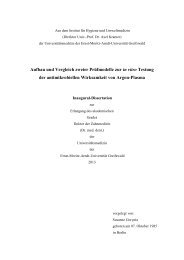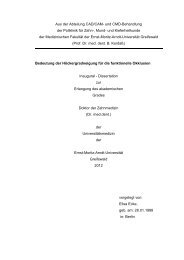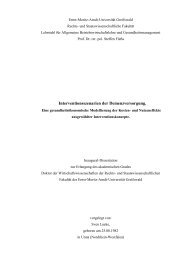Urban Green Areas – their functions under a changing lifestyle of ...
Urban Green Areas – their functions under a changing lifestyle of ...
Urban Green Areas – their functions under a changing lifestyle of ...
Create successful ePaper yourself
Turn your PDF publications into a flip-book with our unique Google optimized e-Paper software.
As the economy grows <strong>–</strong> Vietnam’s goal is to be an industrialized country by 2030 <strong>–</strong><br />
participation seems to be not only necessary but inevitable in any political process. LE<br />
Kuan Yew, Singapore’s president, argued 20 years ago already (1991): “Once you reach a<br />
certain level <strong>of</strong> industrial progress, you have got an educated workforce, an urban<br />
population, you have managers and engineers. Then you must have participation because<br />
these are educated, rational people. If you carry on with an authoritarian system, you will<br />
run into all kinds <strong>of</strong> logjams.”<br />
Thus many NGOs come to Vietnam to support the Vietnamese government with advanced<br />
policy from developed countries. They also collaborate with local citizens and experts to<br />
change the political system. Recently, several NGOs worked with the Vietnamese<br />
government to develop planning processes as well as to provide tools and establish<br />
frameworks to support the development <strong>of</strong> participation processes. For instance, Health<br />
Bridge and UN Habitat assist the government in policy-making and public forums (Hanoi<br />
public city) and public bodies (Ashui, an architecture forum) provide platforms for citizens<br />
to criticize policies, plans and the cities’ news.<br />
Nowadays you can observe situations where Hanoians raise <strong>their</strong> voices about urban plans<br />
or to complain about abuses. An current example is the collective claims concerning a<br />
children’s playground close to a housing area (EXPERT-F 2012). This has been achieved<br />
by using the new communication channel <strong>of</strong> social media.<br />
The vanguards, those who first debate against irrational plans, are architects, scientists and<br />
other well-educated people. Of course, these do not represent the majority <strong>of</strong> inhabitants.<br />
But nevertheless, it is a first step and gives other people examples, ideas and also courage<br />
to discuss and to call for more transparency.<br />
Slowly, there are more and more people who are well educated and well behaved in the<br />
community; these vanguards drive to new trend <strong>of</strong> <strong>lifestyle</strong> by which people make claims<br />
better for society’s needs. Through <strong>lifestyle</strong> changes, people learn how to claim for <strong>their</strong><br />
own demands. Everyday topics (body, health, exercise, weight, appearance and vitality) are<br />
commonly conversed and advice exchanged (see CRAIG 2002).<br />
Moreover, the fast development <strong>of</strong> technology <strong>–</strong> internet platforms, social networks, etc. <strong>–</strong><br />
delivers useful tools for raising citizen’s opinions. There are already websites about parks<br />
in Hanoi (for instance, http://60s.com.vn/V-Congvien-Hanoi.aspx#top) and even a single<br />
website for the big park (Thong Nhat). However, <strong>their</strong> function is just to introduce the<br />
parks; it is not a platform for people to comment or to improve those parks.<br />
Sufficient conditions to ensure “that government at the local level can become more<br />
responsive to citizen desires and more effective in service delivery” and finally ‘democratic<br />
112



